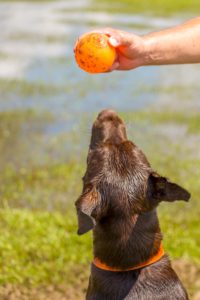A simple fact of biology is that all organisms do more of what rewards them. If you received twenty dollars every time you smiled, you’d walk around grinning. If wearing a certain coat predictably unleashed a flurry of compliments on you, chances are that coat would spend very little time in your c loset.
loset.
Dogs are no different. Any behavior they think works to get them something they want becomes more frequent. Say your dog drops a tennis ball in front of you and barks, and you pick up the ball and throw it. You just trained your dog to bark to have his favorite game perpetuated. As a strategy, barking paid off and sure enough your dog will bark more. By contrast, ignoring the ball and walking away teaches the dog that barking doesn’t work. When he next drops the ball by your feet without barking, pick it up and throw it to reinforce the delightful quiet.
This simple exercise contains the essence of dog training: Ignore what you don’t like and be quick to reward what you do like. The principle applies to all situations and it pays to become aware of the many ways we accidentally reinforce behaviors we don’t like. We often reward a dog for jumping up to greet us, either by petting and sweet-talking the dog, or by pushing him away and saying ‘no,’ which is more than enough attention to be reinforcing. Turning away or leaving is much more effective.
To get a well-behaved dog quickly, always be on the lookout for ways to reinforce behaviors you like. Four paws on the floor when greeting, for example, should always earn a ‘good dog’ or a pet or a treat.

